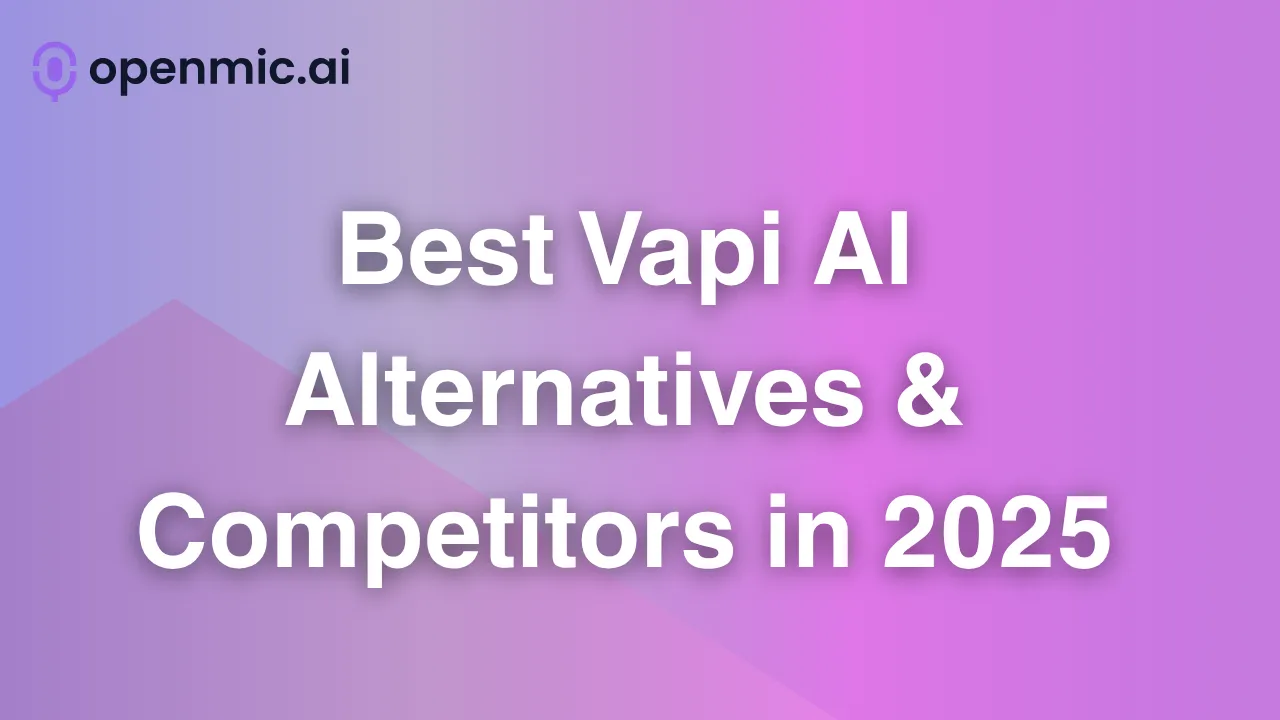
Best Vapi AI Alternatives & Competitors in 2025
The conversational AI landscape is rapidly evolving, and businesses are increasingly seeking reliable alternatives to Vapi AI for their voice automation needs. While Vapi AI promised to democratize AI voice technology, many users have encountered significant challenges including high latency, complex pricing structures, and dependency on external API providers.
If you're experiencing these issues with Vapi AI or simply exploring better options for your business, you've come to the right place. We've thoroughly analyzed the top Vapi AI alternatives in 2025, examining their features, pricing, user reviews, and real-world performance to help you make an informed decision.
Why Businesses Are Looking for Vapi AI Alternatives
Before diving into the alternatives, let's understand why many businesses are migrating away from Vapi AI:
1. Complex Infrastructure Dependencies
Vapi AI operates as a middleware layer, requiring users to bring their own transcription models, LLMs, and text-to-speech engines. This means you're paying for multiple services:
- External transcription providers (like Deepgram at $0.01/minute)
- Language models (GPT-4-turbo at $0.20/minute)
- Voice synthesis models (PlayHT at $0.07/minute)
- Plus Vapi's premium fee of $0.05/minute
For a business handling 10,000 minutes monthly, this can easily cost $3,300+ per month.
2. High Latency Issues
The dependency on multiple external APIs creates network latency problems, especially during peak usage of services like OpenAI. Latency of 3-4 seconds can severely impact call quality and customer experience.
3. Poor Customer Support
Many Vapi AI users report inadequate support, with one user stating: "Support is non-existent, and documentation is extremely poor. I spent hours trying to get things working after their updates broke everything."
4. Limited Built-in Functionality
Without end-to-end infrastructure, businesses often spend 1-2 development sprints building basic functionality that should come standard with an AI voice platform.
What to Look for in a Vapi AI Alternative
When evaluating alternatives, prioritize platforms that offer:
End-to-End Infrastructure: Look for solutions that provide built-in transcription, LLM, and voice synthesis rather than requiring external integrations.
Low Latency Performance: Choose platforms optimized for real-time conversations with minimal delay.
Transparent Pricing: Avoid complex pricing structures with multiple vendor dependencies.
Comprehensive Integration Support: Ensure the platform integrates with your existing CRM, scheduling, and business tools.
Reliable Customer Support: Look for providers offering dedicated support and comprehensive documentation.
No-Code/Low-Code Options: Consider platforms that allow non-technical users to build and deploy voice agents quickly.
Top 6 Vapi AI Alternatives in 2025
1. OpenMic AI - The Smart Choice for Modern Businesses
OpenMic AI stands out as the most comprehensive alternative to Vapi AI, offering enterprise-grade conversational AI with advanced natural language processing and seamless integrations.
Key Features:
- Advanced Conversational AI: Sophisticated NLP engine that handles complex queries with human-like responses
- Smart Appointment Scheduling: Automated booking with calendar integration and intelligent conflict resolution
- Seamless Referral Management: Automated patient/customer routing to appropriate specialists or departments
- Real-Time Analytics Dashboard: Comprehensive insights into call performance, customer satisfaction, and operational metrics
- Multi-Channel Communication: Support for voice, SMS, and chat across multiple platforms
- Enterprise Security: HIPAA-compliant infrastructure with end-to-end encryption
- Custom Integration API: Connect with 1000+ business tools including Salesforce, HubSpot, and Microsoft Teams
Why Choose OpenMic AI:
Unlike Vapi's middleware approach, OpenMic AI provides a complete end-to-end solution. The platform hosts its own optimized AI infrastructure, eliminating external dependencies and reducing latency to under 500ms for most interactions.
Pricing: Starting at $0.05/second for small businesses with transparent per-minute rates and no hidden fees.
User Rating: 4.7/5 stars - Users consistently praise the platform's reliability and customer support.
Check the Link for more information: Click on Post
Check our Youtube Video: Click Video
2. Synthflow AI - No-Code Voice Agent Builder
Synthflow AI offers a drag-and-drop interface for creating voice agents without coding knowledge.
Key Features:
- Drag-and-drop voice agent builder
- Pre-built templates for common use cases
- Integration with Zapier and popular business tools
- 24/7 AI voice assistant support
- Multiple language and accent options
Pricing: Starting at $29/month with a 14-day free trial.
User Rating: 4.5/5 stars
Best For: Small businesses and startups needing quick deployment without technical expertise.
3. Bland AI - Developer-Focused Solution
Bland AI targets developers and large enterprises with its comprehensive API-first approach.
Key Features:
- End-to-end phone agent management
- Custom API integrations for mid-call actions
- CRM updates and appointment scheduling
- Web API interactions during calls
Limitations: Complex setup process and reported call quality issues.
Pricing: $0.09/minute for connected calls only.
User Rating: 2.6/5 stars
Best For: Large enterprises with dedicated development teams.
4. Retell AI - Middleware Alternative
Similar to Vapi AI, Retell operates as a middleware layer but with better documentation.
Key Features:
- HIPAA compliance support
- Multiple language and dialect options
- Low-code infrastructure
- API access for agent management
Limitations: Still requires external LLM and phone providers, lacks third-party integrations.
Pricing: Pay-as-you-go starting at $0.05/minute.
User Rating: 3.2/5 stars
Best For: Healthcare organizations requiring HIPAA compliance.
5. Air AI - Conversational Sales Focus
Air AI positions itself as the "first conversational AI" with a focus on sales interactions.
Key Features:
- Full-length conversation capabilities
- Sales-focused conversation flows
- Cloud-based deployment
- Human-like conversation quality
Major Concerns: Multiple reports of poor performance, hidden costs, and refund issues. Trustpilot rating of only 1.5/5 stars with fraud allegations.
Pricing: $25,000-$100,000 upfront license fees.
Best For: Not recommended due to poor reviews and business practices.
6. Vocode.dev - Open Source Option
The only open-source alternative in our list, Vocode.dev offers flexibility for technical teams.
Key Features:
- Open-source voice assistant framework
- LLM integration capabilities
- Phone call and meeting participation
- Developer-friendly abstractions
Limitations: Requires significant technical expertise and lacks enterprise infrastructure.
Pricing: Free (open source) but requires hosting and infrastructure costs.
Best For: Technical teams with development resources.
Detailed Comparison: OpenMic AI vs. Vapi AI
Healthcare & Dental Practices
Recommended: OpenMic AI or Retell AI
- HIPAA compliance requirements
- Patient appointment scheduling
- Insurance verification capabilities
- Secure patient communication
E-commerce & Retail
For fast-moving e-commerce brands and retail businesses, both OpenMic AI and Synthflow AI are strong contenders. These platforms help automate high-volume customer service inquiries, such as order tracking, shipping status updates, and returns management. With OpenMic AI, businesses also get advanced capabilities like real-time voice automation, lead qualification for upsells, and smart call routing for VIP customers. Both tools support multi-channel communication, allowing seamless interactions across voice, SMS, and chat platforms—ideal for omnichannel brands that prioritize speed and consistency.
Professional Services
For law firms, consultancies, and agencies, OpenMic AI is highly recommended for managing client interactions efficiently. Features such as automated appointment scheduling, routing of service inquiries, and personalized follow-up sequences help reduce administrative workload while improving responsiveness. OpenMic AI integrates directly with popular CRMs and booking tools, ensuring that every consultation, call, and lead is tracked and logged—making it perfect for teams that bill by the hour or rely on consistent client communication.
Small Businesses & Startups
If you're a growing startup or small business, Synthflow AI and OpenMic AI both offer budget-friendly, scalable solutions. These platforms are designed for fast deployment with no-code setup, making them ideal for founders and small teams without in-house developers. Whether you need a voice agent to handle customer inquiries, qualify leads, or automate appointment scheduling, both tools deliver. OpenMic AI stands out for its deeper CRM integrations and customization, while Synthflow appeals to users focused on speed and simplicity. As your business scales, both platforms offer flexible plans that grow with you.
Implementation Best Practices
When migrating from Vapi AI to an alternative:
- Audit Current Usage: Document your existing call volumes, integration needs, and performance requirements.
- Start with Pilot Testing: Begin with a small subset of use cases before full deployment.
- Plan Integration Strategy: Map out connections with your CRM, scheduling, and communication tools.
- Train Your Team: Ensure staff understand the new platform's capabilities and limitations.
- Monitor Performance: Track key metrics like call quality, response time, and customer satisfaction.
- Gradual Migration: Implement a phased approach to minimize business disruption.
Conclusion: Making the Right Choice
While Vapi AI introduced many businesses to conversational AI, its limitations have become apparent as companies scale their voice automation needs. The best alternatives offer end-to-end solutions that eliminate complexity while improving performance and reducing costs.
OpenMic AI emerges as the top choice for businesses seeking a comprehensive, reliable, and cost-effective alternative to Vapi AI. With its advanced conversational capabilities, seamless integrations, and transparent pricing, OpenMic AI provides the foundation for sustainable voice automation growth.
For businesses prioritizing simplicity and quick deployment, Synthflow AI offers an excellent no-code alternative. Organizations with specific compliance requirements should consider Retell AI, while those with substantial development resources might explore Vocode.dev.
Regardless of your choice, moving away from Vapi AI's complex middleware approach toward a more integrated solution will likely result in better performance, lower costs, and improved customer experiences.
Ready to Switch? Start Your Free Trial
Experience the difference with OpenMic AI's advanced conversational platform. Our team will help you migrate from Vapi AI with zero downtime and provide dedicated support throughout the transition.
Get started today:
- 14-day free trial with full platform access
- Free migration assistance from Vapi AI
- Dedicated onboarding specialist
- 24/7 customer support
Frequently Asked Questions
Q1. Can I migrate my existing Vapi AI setup to OpenMic AI?
Yes, OpenMic AI provides free migration assistance to help transfer your voice agents, integrations, and call flows from Vapi AI. Our technical team will work with you to ensure a seamless transition with zero downtime.
Q2. How does OpenMic AI's pricing compare to my current Vapi AI costs?
Most businesses see 40-60% cost savings when switching to OpenMic AI due to our end-to-end infrastructure that eliminates external API dependencies. Contact our sales team for a personalized cost comparison based on your usage.
Q3. What integrations does OpenMic AI support?
OpenMic AI connects with over 1000 business tools including Salesforce, HubSpot, Microsoft Teams, Slack, Zoom, Google Workspace, and most major CRM and scheduling platforms. Our API also supports custom integrations.
Q4. How quickly can I get started with OpenMic AI?
Most businesses can deploy their first voice agent within 15 minutes using our intuitive setup wizard. Complex integrations typically take 1-3 days compared to weeks with Vapi AI's middleware approach.
Q5. Does OpenMic AI offer HIPAA compliance?
Yes, OpenMic AI is fully HIPAA compliant with SOC 2 Type II certification. We provide Business Associate Agreements (BAAs) and maintain strict data security standards for healthcare organizations.
Q6. What kind of support does OpenMic AI provide?
We offer 24/7 customer support via phone, email, and chat, plus dedicated onboarding specialists and technical account managers for enterprise clients. This is a significant improvement over Vapi AI's Discord-only support model.
Explore related blogs
.png)
Voice AI for Mass Tort Lawyers: How Conversational AI Is Revolutionizing Case Intake & Client Engagement
.png)
Top 5 AI Answering Services for Law Firms in 2025 (24/7 Reception & Intake)
.png)
Top 5 White-Label Voice AI Platforms in 2025 (Best for Agencies & SaaS Providers)
Let AI Handle Your Phones So You Can Focus on Growth
Start your free trial and see how OpenMic’s AI voice agents can streamline calls, boost conversions, and deliver fast, 24/7 customer service — without hiring more staff.






.svg)